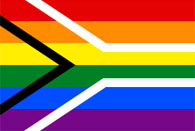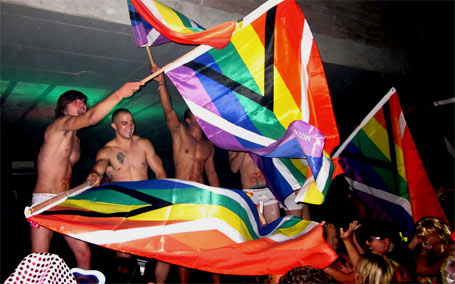It’s an amalgamation of the recognisable gay rainbow flag and the South African national flag.

South Africa’s Department of Arts and Culture approved the registration of the flag last week, reported the Timeslive citing an announcement in the official Government Gazette.
Founder and flag designer Eugene Brockman of Gay Flag of South Africa, a non-profit organisation that submitted the flag for approval as a symbol for LGBTI people was quoted as saying, “The flag has become a symbol of both the celebration of queer South African identity as well as the obstacles and hate crimes LGBTI South Africans face that are unique to this country.”
Mava Mothiba, representing the department's bureau of heraldry, said yesterday there had been no objections to the flag - a combination of the international gay flag and the South African national flag.
"It has been registered under the Heraldry Act and is protected by the act," he said.
The flag was launched in December 2010 at the annual Mother City Queer Project (MCQP) party an annual event hosted by the gay community of Cape Town.
The country decriminalised laws against gay sex in 1994 and in 1996 became the first in the world to outlaw discrimination against sexual orientation under its post-apartheid Constitution.
In December 2005, the Constitutional Court of South Africa ruled that it was unconstitutional to prevent people of the same gender from marrying when it was permitted to people of the opposite gender, and gave the South African Parliament one year to pass legislation which would allow same-sex unions. In November 2006, Parliament voted 230:41 for a bill allowing same-sex civil marriage, as well as civil unions for unmarried opposite-sex and same-sex.












 Printable Version
Printable Version
















Reader's Comments
It is such a pity other African nations do not even recogognise gay people and that in many countries in Africa it is still punishable ( even by death ) there.
It is good to know that the newer recognition areas tend to be more progresive, I.E Tasmania in Australia once the most backward for gay recognition now the most progresive.
While done with the best of intentions, I'm sure, there are a number of slightly disturbing aspects below the surface - If you choose to see and acknowledge them. I suspect most will not - but I wouldn't want any such flag, or feel any need to fit neatly into a segregated little box...
Hell-llo...are you blind?
Those "disturbing aspects" that you anticipate: are they more disturbing than the aspects of continued hatred and violence toward homosexuals? Which scenario may be more managable: (a) continued tolerance of hatred, prejudice,racism and bigotry or (b) taking steps toward acceptance and manifestations of equal human rights?
And, as seems to be the underlying air, here, what of those who don't want such a flag, and don't think it's a good idea? Are they to be excluded, or made pariahs within the so-called gay community? Us, or Them?
Well, fine. If others want such a flag - fine. But it's not for me; i do not see how you can claim equality while using a symbol of difference. A paradox I'm unable to accept, though others clearly are.
The government, obviously, agrees that this may be a positive step forward in the normalization of multiple sexual orientation options in that country. The government may have even issued a position paper on their decision to recognize that colorful gay symbol; which may delineate potential positives and negatives.
It's likely that no one will ever force you to rally around a gay flag (or any other flag) or banner, or symbol of differentiation....and I'm somewhat confident you'll lose no respect or support from any of your significant others as a result.
Real Irish people are so much more gay friendly than many of the pseudo Irish in America.
Equality means equal rights, not equal in the sense of sameness.
Gay identity doesn't put anyones in a box of uniformity - it celebrates diversity rather than oppressing it.
The equality that matters for many of us is not about being indistinguishable. Rather, it represents a desire for legal protection to allow gay feelings to be expressed openly.
After thousands of years of brutal oppression of homosexual love and desire, I don't think the rainbow flag represents a significant problem.
In fact, I'm proud of my country, South Africa, for its international leadership in the area of gay rights - especially, as others have pointed out, in light of the country's history of oppressive differentiation.
The flag represents supportive differentiation.
Please log in to use this feature.